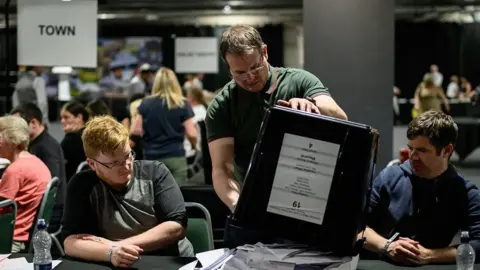The recent local elections in England have stirred significant political activity, particularly following developments overnight. Notably, changes in leadership and party representation emerged across various regions, indicating shifting dynamics among voter preferences. As results continue to trickle in, let’s delve into the key outcomes from these elections and what remains on the horizon.
In the first major development, the Reform UK party achieved a remarkable milestone by winning its inaugural parliamentary by-election in Runcorn and Helsby. This success was particularly surprising as Reform UK managed to snag this seat from the Labour party by a razor-thin margin of just six votes following a recount. Sarah Pochin, the Reform candidate, received 38.7% of the total votes, marking a significant breakthrough for her party. Meanwhile, the Conservative party finished a distant third, while the Green Party secured the fourth position in this heated contest.
Moreover, the political landscape in Greater Lincolnshire appears to be shifting as well, with Reform UK poised to potentially win its first mayoral contest. Former Conservative MP Dame Andrea Jenkyns is reportedly leading as the final votes are tallied, reflecting a growing appetite among voters for alternatives to the traditional party lines.
In terms of council representation, Reform UK was able to demonstrate substantial gains. The party has claimed more than half of the first 100 council seats that have been declared so far, achieving a noteworthy vote share of approximately 38%. A specific highlight is Northumberland County Council, which has declared itself to remain in a state of No Overall Control, although the Conservatives presently hold the most seats. Meanwhile, Reform UK appears to be on the verge of assuming control in Lincolnshire County Council, having captured 14 out of the first 17 declared seats, with Labour, the Liberal Democrats, and the Conservatives each holding just one seat.
Turning our attention to the Labour party, its representatives managed to hold onto three key mayoral positions despite facing stiff competition. In North Tyneside, Labour retained its mayoralty victory by a narrow margin of 444 votes. Similarly, in Doncaster, they secured a win over Reform UK by 698 votes. The Labour party also succeeded in maintaining its stronghold in the West of England mayoral contest, achieving a majority of 5,949 votes, while the Conservatives were pushed back into fourth place, falling behind both Reform and the Greens. This outcome is notable as Labour’s overall vote share saw a decrease, hinting at the growing strength of Reform UK as they positioned themselves as a formidable contender in these elections.
As we look forward, several results are still outstanding, particularly in the mayoral contests for Cambridgeshire & Peterborough and Hull & East Yorkshire, along with the majority of remaining council elections. The counting and results are anticipated to start arriving Friday afternoon, with initial council results expected around 1 PM, followed by the bulk of declarations by early evening.
The Conservative party finds itself in a precarious position, defending the most seats and facing extensive losses anticipated across the country. In regions such as Lincolnshire, they are contending with strong opposition from Reform UK, while in southern England, their rivals are the Liberal Democrats targeting areas like Gloucestershire and Hertfordshire.
One possible silver lining for the Conservatives could emerge from the Cambridgeshire & Peterborough mayoral race, where they hope to capitalize on a split left-wing vote. Conversely, Labour is aiming to make inroads into areas where they performed well during last year’s general election, particularly in Derbyshire and Durham. Meanwhile, competition remains tight in Lancashire as the Greens and pro-Gaza independents pose a threat to Labour’s dominance.
With more elections taking place across various counties such as Devon, Leicestershire, and Oxfordshire, voter turnout and ongoing electoral shifts will be closely monitored. For comprehensive coverage and results, viewers can track updates via BBC One, its live page, and other channels. The political landscape is ripe for change, making upcoming results crucial in determining the future direction of local governance across England.



